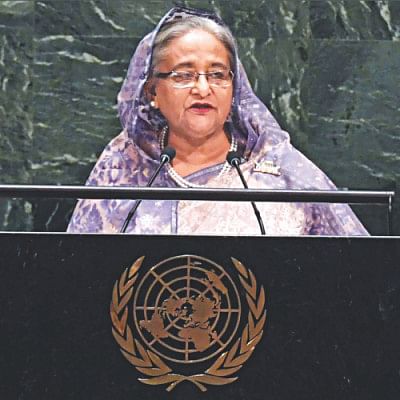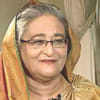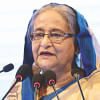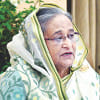Rohingya Crisis: It’s becoming a regional threat

Prime Minister Sheikh Hasina has placed a four-point proposal at the 74th UN General Assembly to resolve the Rohingya crisis which she says is becoming a regional threat.
Addressing the UNGA on Friday, she urged the international community to understand the gravity of the situation as the crisis is now going beyond the Rohingya camps.
“Despite our efforts to contain it, the crisis is now becoming a regional threat. Besides, increasing congestion and environmental degradation is challenging health and security in the area,” she said.
The PM said it was indeed unfortunate that she had to raise the Rohingya issue at the UN again as the crisis remains unresolved.
Hasina said Bangladesh was hosting 1.1 million Rohingyas, who were forced to leave Myanmar due to atrocities committed against them.
“The crisis is now lingering into the third year, yet not a single Rohingya could return to Myanmar due to absence of safety and security, freedom of movement and overall conducive environment in Rakhine State of Myanmar.”
She said Bangladesh was bearing the burden of a crisis which was of Myanmar’s own creation. “It’s an issue solely between Myanmar and its own people, the Rohingyas. They themselves have to resolve it.”
The premier said voluntary return of the Rohingyas to their homes in Rakhine in safety, security and dignity is the only solution to the crisis. She added that Bangladesh would continue its engagement with Myanmar to make the repatriation happen.
The four proposals placed by Hasina are: Myanmar must manifest clear political will supported by concrete actions for sustainable return and reintegration of Rohingyas to Myanmar; Myanmar must build trust among Rohingyas by discarding discriminatory laws and practices and allowing ‘‘go-and-see” visit to Northern Rakhine by Rohingya representatives; Myanmar must guarantee security and safety of the Rohingyas by deploying civilian monitors from international community in the Rakhine state; and the international community must ensure that the root causes of the Rohingya problem are addressed and the violation of human rights and atrocities committed against the Rohingyas are accounted for.
At the 72nd UNGA in 2017, Hasina had put forward a five-point proposal to resolve the crisis. The proposals included full implementation of recommendations of the Kofi Annan Commission, and establishment of a civilian monitored safe zone in Rakhine.
SUPPORT FOR PALESTINIANS
The PM said the value of UN’s role in maintaining international peace and security is enormous. “We stand firm in our support for our Palestinian brothers and sisters till their just and rightful struggle comes to fruition.”
Noting that three million innocent people were killed and 200,000 women violated during Bangladesh’s Liberation War in 1971, she said, “Our painful experiences have emboldened us to continue to speak for the oppressed people.”
About the country’s development, the premier said Bangladesh has often been cited as a “development miracle”. Despite turbulence in the rule-based international order, and apprehensions of gradual economic slowdown, Bangladesh continued to prosper over the last 10 years, she added.
According to the Spectator Index 2019, Bangladesh recorded the highest economic growth in the last 10 years among 26 countries listed, with 188 percent expansion of gross domestic product (GDP) at the current prices.
“Our GDP has grown from $102 billion in 2009 to $302 billion this year. We continue to embark on a pragmatic programme for the rapid economic and social development,” the PM said.
She mentioned that the exports of Bangladesh grew three times from 2005-06 to reach $37 billion in 2017-18, while the per capita income grew 3.5 times and foreign exchange reserve grew nine times to $33 billion. The GDP growth has now reached 8.13 percent.
Describing poverty and inequality as two major obstacles to development, Hasina said Bangladesh has achieved one of the fastest poverty reduction rates in the world with poverty rate dropping from 41.5 percent in 2006 to 21.4 percent in 2018, extreme poverty rate from 24 percent to 11.3 percent.
A key development strategy in Bangladesh has been addressing inequality through social security, decent work and financial inclusion, she said, adding that the social safety net programmes are expanding, now covering nearly a quarter of the population and accounting for 2.58 percent of the country’s GDP.
The PM also highlighted the development and activities in the country’s different sectors, including education, health, electricity, IT, telecommunication and blue economy.
Talking about climate change, Hasina said the global disposition for climate action generated by the just concluded Climate Action Summit would translate into real impetus for implementation of Paris Agreement in the broader context of 2030 Agenda.
Bangladesh’s long-term plan for adaptation and resilience is anchored in our Delta Plan 2100, she said, adding that the plan focuses on food security, water safety, climate change, environment sustainability, disaster management and sustained economic growth.
“Following the recent Dhaka Meeting of the Global Commission on Adaptation, we’re working on setting up a Global Centre for Adaptation in Dhaka,” she said.
About migration, Hasina said Bangladesh promotes safe, orderly, and regular migration. Irregular migration and human trafficking are global menaces rooted in complex nets of syndicates and criminal networks.
“To prevent and suppress human trafficking nationally and also to foster international cooperation in tackling human trafficking, we have recently acceded to the Palermo Protocol on Trafficking in Persons,” she said.
Describing multilateralism as the strongest panacea for resolving the global problems and create global goods, Hasina said the UN is the symbol of hope for peace, stability and prosperity.
“Bangladesh will continue to support the United Nations as a strong multilateral body, which would be fully equipped to deal with the tasks and responsibilities assigned to it under the Charter.”
With the 75th anniversary of the UN coming up next year, the PM call for collective actions to build a stronger UN for the civilisation to deal with emerging challenges of the next century.
She said Bangladesh appreciates the reform initiatives of the UN secretary-general, particularly the UN Development System.
At the outset of her speech, Hasina recalled the architect of Bangladesh, Father of the Nation Bangabandhu Sheikh Mujibur Rahman.
She said Bangladesh is now preparing to celebrate the birth centenary of this great leader from March next year. “Reflecting on his vision and aspirations, we wish to bring this celebration to the United Nations next year,” the PM said.

 For all latest news, follow The Daily Star's Google News channel.
For all latest news, follow The Daily Star's Google News channel. 








Comments